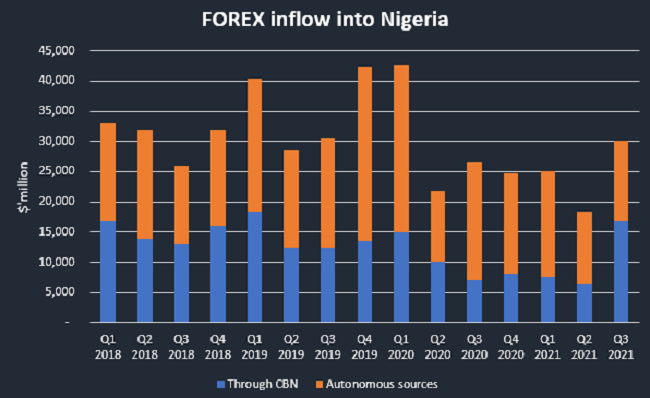Nigeria's new forex plan aims for $200 billion in inflows
- Posted on February 14, 2022
- Stock Market
- By Faith Tiza

Nigeria's new forex plan aims for $200
billion in inflows
Nigeria's central bank has devised a new strategy to
entice $200 billion in foreign direct investment into the continent's largest
economy: make it more appealing for exporters to bring home foreign money.
The Nigerian Central Bank will no longer sell dollars
to local banks, instead of requiring institutions to seek foreign currency on
their own. The regulator would provide export-oriented producers with low-cost
long-term loans and try to persuade exporters to repatriate dollar proceeds and
deposit them with banks.
Nigeria's central bank has struggled to increase
dollar supplies and has frequently changed restrictions in the process. The
most significant shift since it ceased supplying foreign cash to money changers
will be the latest proposal. The regulator expects the measures to boost
foreign-exchange supplies in the next three to five years after the currency
was devalued three times since 2020 due to a drop in crude oil prices, which hurt
inflows.
In an emailed answer to inquiries, Yvonne Mhango,
Africa economist at Renaissance Capital, stated, "I'm not sure why banks
will be more effective at convincing exporters to repatriate their gains to
Nigeria than the central bank." "Without any guarantee that we will
see an uptick in the repatriation of proceeds if the central bank stops supplying
banks," he warned, the naira might plummet.
According to Emefiele, the regulator established an
export support facility that will provide producers with financing for up to
ten years with a two-year moratorium and a 5% interest rate. He also stated
that the central bank will extend by a year a Covid-19 interest rate benefit
that began in 2020 to assist producers.
Dollar
Deficit
The central bank intends to make it more appealing for
exporters to buy local currency and bring their revenues back home.
The 27 percent difference between the official and
parallel market exchange rates of the naira has so far deterred businesses from
repatriating foreign currency to Nigeria.
"We can truly protect the long-term worth of our
currency, as well as the stability of our exchange rate, only by strengthening
this economy's productive and earning capability," Emefiele added.
By 4:30 p.m. in Lagos, Nigeria's commercial metropolis,
the official spot rate had fallen 0.1 percent to 416.71 naira to the dollar.
In July, the central bank accused money changers of
exacerbating a dollar shortage and restricted deliveries to them, depriving the
market of over $6 billion in supply every year. In September, it issued an
order requiring lenders to identify consumers who purchase foreign exchange
using forged documents and publish their names in order to prevent dollar
arbitrage.


Be the first to comment!
You must login to comment